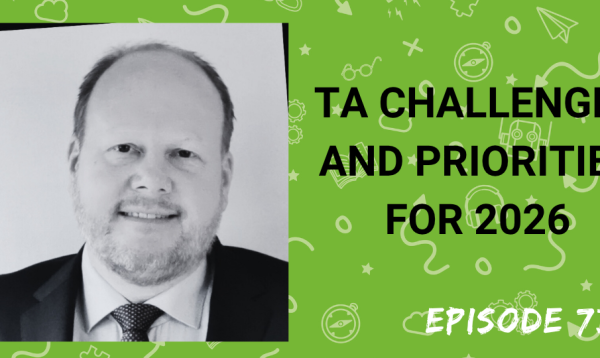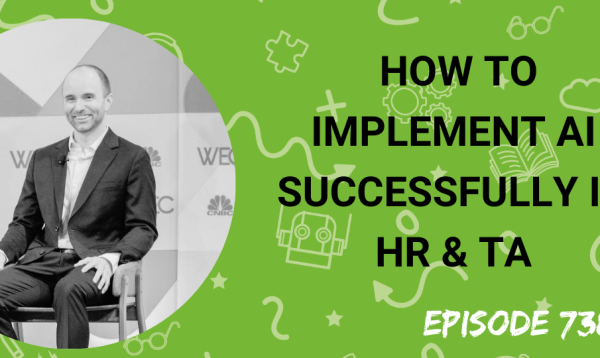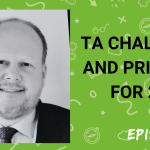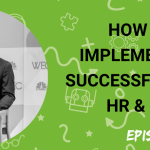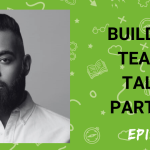It has become very clear from the conversations I’ve been having with employers this year that the problems posed by current and future skill shortages have never been higher on their agenda. The best companies are acting to solve these problems by thinking differently and tapping into some extremely valuable pools of talent that they may have previously overlooked.
My guest this week is Jane Hatton Director of Evenbreak, a job board that matches talented disabled job seekers with inclusive employers.
In the interview we discuss:
• The strong business case for employing disabled people
• Popular misconceptions round the implications of employing disabled people
• How people with particular impairments (autism as one example) can bring particular skills to the workplace
• How employers should go about attracting disabled people to their organization and how they should be adapting their recruitment processes to get the best talent
• Which employers are doing this well
Jane also shares her advice on the first steps employers should take to gain access to this valuable pool of talent
Subscribe to this podcast in iTunes
Transcript:
Matt Alder [00:00:00]:
Before we start the show this week, I wanted to let you know that the book I’ve co authored with Mervyn Dynan is now available for pre order. The book is called Exceptional Talent and looks at what companies are doing to attract, hire, develop and retain the very best people for their business. The book starts shipping in May, but you can reserve a discounted copy right now by going to Bit ly Exceptional Talent and using the discount code FHRINGERET20. That’s Bit Lee Exceptional Talent and the discount code FHRE20. I’ll also put that information in the show notes for this week’s episode.
Matt Alder [00:01:04]:
This is Matt Alder. Welcome to episode 80 of the Recruiting Future podcast. It’s become very clear from the conversations I’ve been having with employers this year that the problem of skill shortages has never been higher on their agenda. The best companies are solving their problem here by thinking differently and tapping into some extremely valuable pools of talent they may have previously overlooked. My guest this week is Jane Hatton, who runs Evenbreak, a job board that matches talented disabled job seekers with inclusive employers. In our interview, Jane brilliantly sets out the business benefits for employers who engage with this important audience of talent.
Matt Alder [00:01:48]:
Hi, Jane and welcome to the podcast.
Jane Hatton [00:01:51]:
Hello, Matt. Good to be here.
Matt Alder [00:01:53]:
So could you tell everyone who you are and what you do?
Jane Hatton [00:01:57]:
Yes. So, I’m Jane Hatton and I run Evenbreak, which is a not for profit job board which helps disabled candidates get in touch with employers who might be keen to access that talent. So basically it’s a job board like any other, but we just specialise in working with disabled candidates and inclusive employers.
Matt Alder [00:02:17]:
And how do employers tend to respond when you, when you talk to them about attracting disabled talent in such a.
Jane Hatton [00:02:25]:
Variety of different ways? Often it’s a case of, oh, no, we wouldn’t want to employ disabled people because it’s going to cost too much, or they’ll be off sick all the time, or there’ll be a health and safety risk. Others will say things like, well, we know we really ought to because it’s really a shame for these disabled people. But, you know, we are a business, not a charity, and we just can’t afford to have passengers. And then we do get some enlightened employers who actually recognise that there is a really good bottom line business case for employing disabled people and they’re keen to find out more. But there’s definitely A huge education piece to be done around looking at disabled candidates, not as charity cases, people who need a pat on the head and a bit of a chance, but as actually a pool of talent that are largely untapped by employers. And it’s the case that the candidates are almost doing the employers a favour by working for them because they bring so much of value with them. So it’s certainly not a case of, well, we ought to do this because it’s the right thing to do. Yes, of course it’s the right thing to do. But actually, you know, we try to get employers to look at this as an issue around accessing valuable talent rather than some kind of corporate social responsibility initiative.
Matt Alder [00:03:43]:
I think that’s really interesting because I met you and I sort of heard you, heard you talking about this at an event last week that the rec we’re running in London. And in the conversation we were talking about talent shortages, hard to find talent and just what exceptional talent looks like for an organization. And I thought what you were saying was really, really interesting.
Matt Alder [00:04:08]:
How, what, what aspects of the, of.
Matt Alder [00:04:11]:
The business case for this are there that employers should be aware of?
Jane Hatton [00:04:15]:
Yeah, well, there’s actually quite a lot. I mean, I think there are some generic business reasons for employing disabled people, which are things like, and there’s so much research around this and I can, you know, if any of your listeners are interested in having a document around this, I’m happy to send it to them. But things like, lots of research has been shown that disabled employees, on average, and of course there are always going to be individual differences, but on average, disabled employees are every bit as productive as non disabled employees. But interestingly, in things like sickness absence, there is an incredible difference between the rate of sickness absence between disabled employees and non disabled employees in that disabled employees have far less sickness absence, which actually surprises many people when they first hear it. But I suppose if you think about someone who’s dealing with, I don’t know, severe pain or other symptoms every day and they get a bit of a sniffle, they’re not going to phone in sick, like maybe a non disabled person might. So those are two things. Also, in terms of retention, disabled people tend to stay in their jobs much longer. I know that for a lot of employers, turnover, staff turnover is a large issue and very, very expensive if you’re constantly having to recruit and retrain people. And also in terms of workplace accidents, actually the research shows that disabled candidates and employees have far fewer accidents in the workplace. So again, they’re a safer bet. And Then also things like, if you look at what we’re now calling the purple pound, so the money that disabled people in the UK spend per year is around 200 billion. So we’re talking about, you know, if you have inside intelligence in your organization from people who are disabled, they’re able to help you tap into that customer base that’s worth so much. So those are kind of general business benefits. But also there are lots of people who have particular impairments who might bring particular skills that others might not. So for example, some of the employers that work with us are specifically looking to target candidates who are on the autism spectrum because typically, and again, you can’t generalise, but typically people with autism have very rational ways of thinking, very logical ways of thinking. They can spot, for example, mistakes in coding much more quickly and accurately than the rest of us who don’t think like they do. They’re also very good at repetitive work. So there is an argument for targeting people even with specific so called impairments that gives them an added advantage over and above others. I heard of a case recently that hadn’t really occurred to me that people who are blind and are Braille readers are very good at examining women for lumps in the breast because their fingertips are so much more sensitive than anybody else. And it’s kind of looking at disability in a different way, that there may be some impairment, but there may be, then that might be compensated by being able to do other things better than most people can. So it’s very, very interesting. But I do think there’s a wealth of talent and skills out there that employers really should and could be benefiting from that at the moment. They’re just not.
Matt Alder [00:07:33]:
Why are employers not doing this? I think you sort of COVID you know, some of the issues at the, at the beginning of the, at the beginning of the conversation.
Matt Alder [00:07:42]:
But, you know, what are the sort.
Matt Alder [00:07:43]:
Of specific things that come up and how should employers think about, you know, attracting this type of talent into their businesses?
Jane Hatton [00:07:52]:
Yeah, I think, I think the reason that people are reluctant and, you know, employees are reluctant and I don’t think it’s ever out of malice, it’s not a kind of deliberate desire to discriminate against disabled people. I think it’s usually based on fear and probably ignorance. And I think certainly a lot of employers I speak to assume that if you employ a disabled person, you’ve pretty much got to knock down the building that you work in and completely rebuild it from scratch to make it accessible. And you’ve got to rewrite all of your policies to make sure that everything is accessible. And actually, that’s rarely the case. Well, it’s never the case. You’d have to demolish your building. But most disabled candidates need very, very few, if any, adjustments in order to work in a workplace. And if they do need adjustments, it might be something really simple, like flexible working hours or, you know, for somebody who’s got visual impairment, making sure that the corridors are free of boxes and things to stop them tripping over nothing major. And if there are more expensive adaptations that people might need, they might need assistive technology, then the government has an initiative called Access to Work, which will help organizations to identify things that will help, but also to pay all of or towards that expense. So I think that a lot of the fears that people have are based not in reality, but in not really knowing enough about what it all entails. And it’s usually much, much more simple than anybody thinks. And certainly employers that we work with who have started employing disabled people are amazed A how easy it is and B, how it’s worth it, because then you get that talent that you might not otherwise had. But having said all that, you know that, yes, organisations should be trying to tap into this talent pool. Disabled people are notoriously a difficult group to attract, and that’s for a number of reasons, but mostly because there is a history for disabled people of being discriminated against, either in the recruitment process or in the workplace. And so people are reluctant to apply. Why would you keep knocking your head against that brick wall? Certainly, when I talk to our candidates, their experience is that if you send a CV for a job with a covering letter that says, oh, by the way, I have this impairment, they will never get asked for interview. If they don’t mention their impairment, and they do get asked for interview, and then they say something like, is it in an accessible building because I use a wheelchair? That’s when they’re rejected. So their experience is the minute I mention my impairment, wherever it happens in the recruitment process, is the moment I get rejected. You can understand why they might be a little bit more reluctant to apply for jobs. So what employers need to do in order to overcome that is to make a special effort. It’s not enough just to say a throwaway comment on a job advert like, we’re an equal opportunities employer, because nobody’s going to state openly they’re going to discriminate against disabled people. So employers really need to work that bit harder to convince disabled talent that applying to their organisation is worth it, because they are looking for the talents and skills rather than being worried about the impairments, so they can do things like Positive Action. So that could mean advertising in disability journals, so journals like Disability now or Possibility Enable, so they’re going to where disabled candidates might be, or they might use particular charities, or they can use specialist job boards like Evenbreak. Because our candidates tell us that if an organisation has gone that little step further and paid to advertise in a place which makes it clear they’re going to take those applications seriously, A, the candidate’s more likely to apply because they believe that they won’t be immediately discounted, and B, interestingly, they’re more likely to be open about their impairment, which makes the rest of the recruitment process so much more easy, because then any adjustments that might be needed can be put in place right from the start. So I think it’s just a case of employers having to go that extra mile to convince disabled candidates that they will be welcome, that they will be looked at in terms of have you got the skills and the talents we’re looking for, and if there are reasonable adjustments that they will be accommodated. And as I say, rarely there are adjustments anyway.
Matt Alder [00:12:24]:
And so in terms of the sort of recruitment process itself, is there anything that employers should be aware of in terms of making the recruitment process work in the best possible way?
Jane Hatton [00:12:37]:
Well, yes, I think we tend to do what we’ve always done without really questioning it. And for a lot of disabled people, there will be touch points in the recruitment process that will make them come up against a brick wall. So, for example, a lot of employers will insist on an online application and that may not work for everybody. Interviews are seen as the kind of only way to assess people’s readiness to do a particular job. And some people are very, very. I mean, we know this as recruiters, some people are brilliant at selling themselves at interview, but not very good at the job, and other people who may be great at the job just aren’t very good at selling themselves. But if you’re disabled, you know, if you’re deaf or if you’re autistic, then actually you’re not going to sell, you’re not really going to shine at interviews in the same way that maybe your non disabled colleagues will. So it’s really about being flexible, allowing different ways of applying for jobs, whether it can be online or offline, or help to complete an application form, realising that CVs don’t always reflect the talent of the person that’s written it, and also looking at different ways of Assessing talent. So, yes, you might use interviews, but you might also use work trials or tests, you know, other ways of finding out if a candidate is really the right person for the job. I’m sure we’ve all been in a situation where we’ve, you know, seen a brilliant CV and a great interview and then take somebody on and be really disappointed that they haven’t lived up to expectations. So I think it’s about being flexible and looking at each touch point in the recruitment process to see if it could be inadvertently off putting or excluding completely some disabled candidates who might wish otherwise to apply.
Matt Alder [00:14:23]:
So which employers are doing this? Well, who’s making a great job of this?
Jane Hatton [00:14:29]:
Yeah, I think, you know, when employers talk to us, sometimes they’ll say, you know, we haven’t got everything right yet. And. And I do think it’s a journey, so I don’t think anybody’s got it right. I think it’s about continuing to learn and improve on what we’re doing. But there are organizations that stand out, like, for example, Channel four. You know, they. They have done a lot of work in terms of broadcasting, so, you know, they did the Paralympics, they had disabled reporters on, you have the disabled news readers, so in front of the camera, as it were, but they’re really now working hard to get it right behind the scenes as well, so that it’s not just the person in front of the camera that’s disabled, but also that their production teams or their support teams are also representative of the population. So they’re working really hard in terms of looking at their recruitment process, advertising in places like Evenbreak, but also doing things like holding apprenticeships specifically for disabled candidates, so that they’re doing quite a lot of positive action. And I think if you talk to candidates about, you know, which. Which employees really stand out as employers who are at least trying their best in this area. Channel 4 would come, you know, fairly high on that list. And I don’t think disabled people would hesitate if they got the right skills, obviously, that they were looking for to go for a job with Channel 4. So that’s an obvious one, but I think some of the others, and probably where you wouldn’t expect some of the banks doing a lot of good work in this area in diversity generally, you know, a lot have done lots of good work with attracting women, doing more flexible working for parents of young children or carers of other people in their family. But Lloyds bank, for example, are exceptionally good at reasonable adjustments, so workplace adjustments. They have a team of people and a Robust process that will really support employees who need particular support, whether it’s mental health support or whether it’s assistive technology or whether it’s flexible working, whatever it might be, that’s done systematically across the whole of the organisation and it’s working really well. They’re attracting some amazing talent that they perhaps wouldn’t have otherwise done. So.
Matt Alder [00:16:41]:
So if there are any employers listening who want to attract more disabled people to their. To their business, what’s your advice in terms of. I suppose, firstly, the first thing that they should. That they should do the first step on the journey and secondly, where they can go to, you know, find more information and to educate them more fully on this topic.
Jane Hatton [00:17:05]:
Yeah, I think the first thing for them to do, really, is to be very clear on the why they want to attract disabled candidates. If it’s because they think it’s going to make them look good, or it’s going to fill their corporate social responsibility targets, then that’s fine. But actually, it needs to be much more of a robust business case. So I think they need to be making a real business case within their organisation about, you know, we have an issue with high staff turnover. What can we do about that? Well, actually, employing disabled people could be one way, so they need to really find out the expectations that they’re trying to fill by employing disabled people. And then, as I said before, I think they need to be going the extra mile so that disabled people are confident to be able to apply to them. The Government has a scheme called Disability Confidence, which is relatively new and still in its early stages, but there’s certainly information that they can find about that. There’s an organisation called Purple, which can be Googled, which will give them lots of information on Disability Confidence. Obviously, we’d be very happy to talk to employers about a range of strategies that they could use. And actually, interestingly, what we’re doing currently is developing a best practice portal so that employers can use us not just to advertise their vacancies, but also to learn about good practice from other organisations who have already been there and done it, rather than trying to reinvent the wheel. So we’d certainly be very happy to discuss, with no obligation, obviously, with any employers, other places that they could go and we can recommend other providers that would be useful as well. So very happy to have that conversation with anybody. We’re a social enterprise, so our mission is to make the world of work much more accessible, inclusive to disabled people. Whether that results in business for us or not is less relevant.
Matt Alder [00:18:55]:
Jane thank you very much for talking to me.
Jane Hatton [00:18:58]:
My pleasure. Thank you.
Matt Alder [00:19:00]:
My thanks to Jane Hatton. You can subscribe to this podcast on itunes, on Stitcher, or via your podcasting app of choice. Just search for Recruiting Future. You can find all the past episodes@www.rfpodcast.com on that site. You also subscribe to the mailing list and find out more about working with me. Thanks very much for listening. I’ll be back next week and I hope you’ll join me.



